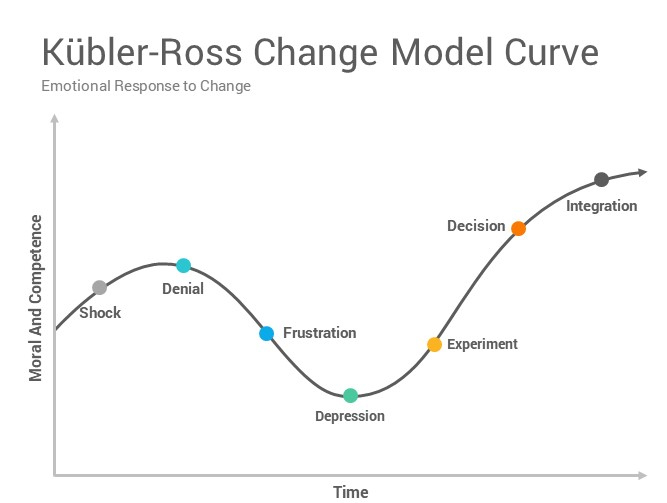
Saxton Bampfylde’s Leadership Services team works as an extension of organisations across the UK to help them appoint and develop the very best leaders. We consider the impact of the COVID-19 pandemic and the traits of leadership that will subsequently be most relevant.
The regulation sector spans almost every area of consumer and corporate life. This brings considerable requirement for a long-term, wide lens approach and demands best practice and transparency as standard. In the times we face today however, there are certain characteristics that will, and indeed, must dominate to transition successfully through this pandemic paradigm.
Who is the leader of the future?
It is still relatively early days to say with any confidence what is in store for the new world paradigm and how leaders will be expected to navigate it. However, there are well established behavioural models such as Kübler-Ross’ ‘Change Curve’ which give us insights into how people respond when faced with significant threats and need for change.

Resilience and adaptability are paramount
For the immediate, what is obvious is the need for leaders to tolerate exceptional levels of ambiguity and cope with the inevitable pressures and emotional strain this will cause them and those around them. In the regulation sector we typically see those with greater capacity for dealing with complexity through a stronger analytical approach and this will potentially benefit those in leadership positions now and in the future.
Tactical and operational working as standard
Resilience will be tested to extraordinary levels, from the way leaders and their teams deliver their functional responsibilities to how they manage new pressures on them personally and outside of work. For instance, leading teams remotely has become something of necessity overnight as has the need to accept a blurring of boundaries between professional and personal life, not to mention the very real and apparent risks to health. These challenges can be enhanced and exacerbated by technological innovation and how this is both implemented and supported logistically and emotionally will make a significant difference to team dynamics.
We will see a greater focus for hands-on operational leaders to transition through this period of upheaval and keep the ship steady. While adaptability is key, the need to remain calm and focused also offers greater stability and clarity that will once again transition into long-term strategic planning when the time is right.
Humanity and hard truths
How leaders continue to assess whether they are getting the best from their colleagues, particularly when working remotely, is undeniably harder for many across regulators, and indeed other sectors. While there is always a place for trust, compassionate leadership and the need for humanity, there will be some tough decisions to make in the coming months and years ahead. Those authentic leaders who foster confidence and belief in their people are likely to come out best and breed safe, collaborative and innovative cultures in future.
Reality is virtual
When appointing new leaders in a time of global crisis, the stakes are unquestionably greater than ever. Hiring panels want increased reassurances, especially as they may have less opportunity to meet candidates in person. Psychometric profiling, assessments and task-based online exercises are becoming increasingly popular, but require established methodologies for delivery, with leaders willing to participate in a virtual environment.
Transitioning through the curve
Our in-house psychologists and behavioural scientists are on-hand to advise on how organisations and their leadership teams can best work through the change curve, providing practical and evidenced based interventions.
